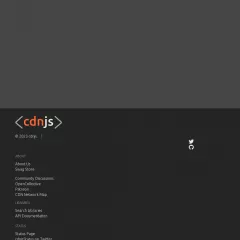
cdnjs (Content Delivery Network for JavaScript) is a popular open-source public content delivery network (CDN) that hosts a vast collection of JavaScript libraries, CSS frameworks, and other web development resources. It serves as a central repository for hosting and distributing these files, allowing developers to easily include them in their web projects.
Key features and characteristics of cdnjs include:
Library Hosting: cdnjs hosts a wide range of JavaScript libraries and CSS frameworks, including popular ones like jQuery, React, Angular, Bootstrap, and many more. These libraries are available for public use and can be easily included in web projects by referencing the appropriate CDN URL.
Content Delivery Network: cdnjs operates as a global CDN, meaning that it has servers located in different geographic regions. When developers include a library from cdnjs in their web pages, the content is delivered from the nearest server to the end user, ensuring faster loading times and reducing latency.
Versioning and Updates: cdnjs supports versioning for libraries, allowing developers to specify the exact version they want to include in their projects. This ensures that projects remain stable and compatible with the desired library version. Additionally, cdnjs regularly updates its library collection to include the latest versions of popular JavaScript and CSS resources.
Performance Optimization: cdnjs is designed to optimize content delivery and improve website performance. By leveraging its global network of servers and using techniques like content compression, caching, and parallel loading, it helps reduce bandwidth usage, decrease latency, and improve overall page load times.
Simplified Integration: Integrating libraries from cdnjs into web projects is straightforward. Developers can include the appropriate script or stylesheet tag in their HTML files, referencing the library's CDN URL. This eliminates the need to download and host the library files locally, simplifying the setup process.
Open Source and Community-Driven: cdnjs is an open-source project that welcomes contributions from the developer community. It is maintained and supported by a community of developers who collaborate to ensure the availability and quality of the hosted libraries.
Extensive Library Collection: cdnjs offers a vast library collection that spans various categories, including JavaScript frameworks, CSS frameworks, JavaScript charting libraries, icon sets, fonts, and more. This wide selection allows developers to find and include the necessary resources for their projects without the need to host them locally.
Accessibility and Reliability: cdnjs aims to provide high availability and reliability for the hosted libraries. By leveraging a distributed network of servers and employing best practices in content delivery, it ensures that the libraries are accessible to developers worldwide and can handle high traffic demands.
cdnjs is a valuable resource for web developers, as it provides an easy and efficient way to include popular JavaScript and CSS libraries in their projects. By utilizing cdnjs, developers can improve the performance, reduce bandwidth usage, and enhance the user experience of their web applications or websites.
Key features and characteristics of cdnjs include:
Library Hosting: cdnjs hosts a wide range of JavaScript libraries and CSS frameworks, including popular ones like jQuery, React, Angular, Bootstrap, and many more. These libraries are available for public use and can be easily included in web projects by referencing the appropriate CDN URL.
Content Delivery Network: cdnjs operates as a global CDN, meaning that it has servers located in different geographic regions. When developers include a library from cdnjs in their web pages, the content is delivered from the nearest server to the end user, ensuring faster loading times and reducing latency.
Versioning and Updates: cdnjs supports versioning for libraries, allowing developers to specify the exact version they want to include in their projects. This ensures that projects remain stable and compatible with the desired library version. Additionally, cdnjs regularly updates its library collection to include the latest versions of popular JavaScript and CSS resources.
Performance Optimization: cdnjs is designed to optimize content delivery and improve website performance. By leveraging its global network of servers and using techniques like content compression, caching, and parallel loading, it helps reduce bandwidth usage, decrease latency, and improve overall page load times.
Simplified Integration: Integrating libraries from cdnjs into web projects is straightforward. Developers can include the appropriate script or stylesheet tag in their HTML files, referencing the library's CDN URL. This eliminates the need to download and host the library files locally, simplifying the setup process.
Open Source and Community-Driven: cdnjs is an open-source project that welcomes contributions from the developer community. It is maintained and supported by a community of developers who collaborate to ensure the availability and quality of the hosted libraries.
Extensive Library Collection: cdnjs offers a vast library collection that spans various categories, including JavaScript frameworks, CSS frameworks, JavaScript charting libraries, icon sets, fonts, and more. This wide selection allows developers to find and include the necessary resources for their projects without the need to host them locally.
Accessibility and Reliability: cdnjs aims to provide high availability and reliability for the hosted libraries. By leveraging a distributed network of servers and employing best practices in content delivery, it ensures that the libraries are accessible to developers worldwide and can handle high traffic demands.
cdnjs is a valuable resource for web developers, as it provides an easy and efficient way to include popular JavaScript and CSS libraries in their projects. By utilizing cdnjs, developers can improve the performance, reduce bandwidth usage, and enhance the user experience of their web applications or websites.